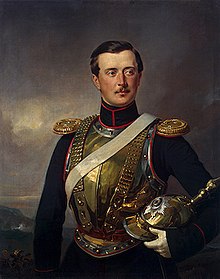Pyotr Andreyevich Shuvalov

Count Pyotr Andreyevich Shuvalov (Russian: Граф Пётр Андре́евич Шува́лов) (27 July 1827, Saint Petersburg – 22 March 1889, Saint Petersburg) was an influential Russian statesman and a counselor to Tsar Alexander II.
Biography
Pyotr Andreyevich came from the
After graduating from the
In 1860 Shuvalov was appointed director of the Department of General Affairs of the
After
Shuvalov was in favor of developing local self-government but on the basis of strengthening the political position of the landed gentry. In the long run, he envisioned a system of national representation with a constitution and a bicameral parliament, modelled on the earlier aristocratic English model, but he disclosed his parliamentary ideas only in 1881, when he had safely retired:[2]

- an advisory assembly can bring no benefit whatsoever. One must openly introduce a constitutional system by establishing two houses and giving them a decisive voice. If this cannot be done immediately, one must, at least, erect a foundation upon which real representative government could eventually arise.
Shuvalov continued his predecessors' reforms although more cautiously. He reorganized
In 1873, Shuvalov was sent to
In April 1874, the
Shuvalov played an important role in the negotiations between Russia and
Notes
- ISBN 0-691-02947-4p. 114
- ^ See:
- Peter Waldron. The End of Imperial Russia, 1855-1917, St. Martin's Press, 1997, ISBN 0-312-16537-4p. 16
- Valentina G. Chernukha and Boris V. Anan'ich. "Russia Falls Back, Russia Catches Up: Three Generations of Russian Reformers" in Reform in Modern Russian History: Progress Or Cycle?, tr. and ed. Theodore Taranovski, Cambridge University Press, 1995, Kennan Institute for Advanced Russian Studies of the Woodrow Wilson International Center for Scholars), p. 73-74
- Peter Waldron. The End of Imperial Russia, 1855-1917, St. Martin's Press, 1997,
- ISBN 1-898855-59-5, 295p. Part III
- ISBN 0-521-89446-8p. 38
- ISBN 0-7658-0443-3pp. 173–174.
- ISBN 0-7864-1612-2p. 188.
References
- Weeks Jr, Richard G. "Peter Shuvalov and the Congress of Berlin: A Reinterpretation." Journal of Modern History 51.S1 (1979): D1055-D1070. online
- Valentina G. Chernukha and Boris V. Anan'ich. "Russia Falls Back, Russia Catches Up: Three Generations of Russian Reformers" in Reform in Modern Russian History: Progress Or Cycle?, tr. and ed. Theodore Taranovski, Cambridge University Press, 1995, ISBN 0-521-45177-9(Papers from a conference entitled "Reform in Russian and Soviet History -- Its Meaning and Function" held May 5-May 7, 1990, organized by the Kennan Institute for Advanced Russian Studies of the Woodrow Wilson International Center for Scholars)
- This article incorporates text from a publication now in the public domain: Chisholm, Hugh, ed. (1911). "Shuválov, Peter Andreivich, Count". Encyclopædia Britannica. Vol. 25 (11th ed.). Cambridge University Press.
External links
![]() Media related to Pyotr Andreyevich Shuvalov at Wikimedia Commons
Media related to Pyotr Andreyevich Shuvalov at Wikimedia Commons
